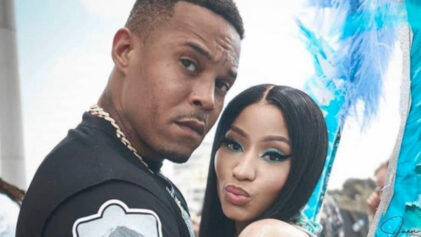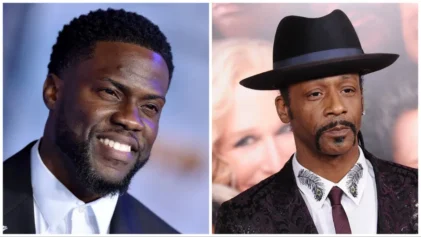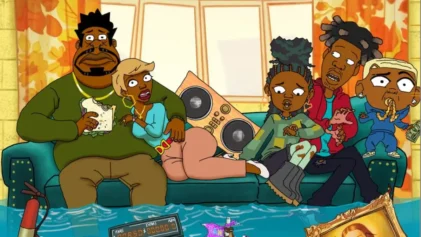Netflix dropped the trailer for “Roxanne Roxanne” and Hip-Hop fans went crazy. It’s a true life story about the New York rapper Lolita Gooden, better known as Roxanne Shanté and her rise to rap stardom in the mid-’80s.
The movie follows the teen MC who grew to prominence when she answered the group UTFO’s song “Roxanne Roxanne” in 1985.
Although the New York foursome admitted the song wasn’t about Shanté and actually about a woman named Adelaida Martinez — aka The Real Roxanne — Shanté and Magic responded with “Roxanne’s Revenge,” which became a hit.
Besides being one of the first female battle rappers ever, Shanté has also been credited with being hip-hop’s first feminist and standing up for women who’ve been aggressively approached on the street by men. Because if you remember, “Roxanne Roxanne” is about UTFO trying their hardest to get a woman’s attention, even though she’s repeatedly expressed disinterest.
In a past interview, Shanté spoke about her feminist stance in hip-hop, and how she refused to let anyone in the music industry objectify her. In fact, that mentality was shaped very early on, she said, during her first dealings with the opposite sex.
“The reason I always chose not to be objectified by wearing scanty clothes and everything else was that ever since I was 14 years old, every man I met, no matter how old they were, the first thing that came out they mouth was ‘Roxanne, Roxanne / I wanna be your man,’” she said in 2016. “To constantly hear that, you didn’t want to necessarily fit into that mold. You still wanted to be off-limits to them. You couldn’t come with your boobs all out, because now they feel like there’s that possibility of doing that.”
But Shanté said it’s much harder for female rappers to have that mentality these days because record companies focus far too much on appearance, which has plenty to do with the creation of music videos.
Shanté also said that female rappers have to be part MC, part fashion model to be noticed, and how they look supersedes what they’re able to contribute in terms of lyrics and songwriting. She talked about Nicki Minaj as well and why it took several years for a female rapper to thrive in hip-hop before her arrival.
“There’s a lot of pressure that comes from record companies, PR people, that make female rappers feel they need to do whatever is in,” said Shanté. “You need to do whatever is poppin’. They don’t do that to the male rappers. They can come in and just come in.”
“[By the time Nicki Minaj came] the most popular figure for young girls in hip-hop was whoever the video girl was,” she added. “That put the pressure on a whole generation of young girls to do sit-ups, which you see I don’t do any. Implants, which you see I have none. It put a lot of pressure on them to stand in this hip-hop thing, which is such a part of our culture, so embedded in our lives.”
Gwendolyn D. Pough Ph.D, who teaches women’s studies at Syracuse University, said although Shanté was known as a battle rapper she paved the way for female MCs to talk about a host of topics that would go on to empower millions.
“Because her record did so well and broke so much ground, we had an influx of female MC’s after her,” she explained. “We had Salt-N-Pepa, we had MC Lyte, we got Queen Latifah and those women aren’t coming out with answer rap. Queen Latifah’s ‘U.N.I.T.Y.’ isn’t an answer to anybody’s else’s rap. It’s talking about issues she’s concerned with and her setting the conversation on her own terms. I don’t know if we’d get that without ‘Roxanne’s Revenge.’”
One of UTFO’s members, The Educated Rapper, who tragically passed away last year, admitted that “Roxanne Roxanne” was a sexist song, which seems to confirm Pough’s point that Shanté gave female rappers a voice.
Last year Mimi Valdes, one of the producers of the biopic, said Shante’s story always inspired her but she didn’t fully understand how important the rapper was until later in life.
“I was thinking, ‘Gosh, this girl was so young. When I was a fan, I was too young to see how significant that was, how crazy that was,” she explained. “But she was part of this legendary moment in hip-hop, and I knew she had a child at a young age. I was just curious what all that was about.”
“I literally froze in my bedroom and scrambled to find a tape and recorded ‘[Roxanne’s Revenge]’ off the radio, because I didn’t understand what I was hearing,” Valdes recalled. “That attitude and willingness to stand up to guys was just amazing. You just never heard of anything like that in a record. Ever. No girl did that.”
“Roxanne Roxanne” premieres March 23 on Netflix, and the trailer has already sparked a lot of excitement on social media.
YOOOOOOO! I’m here for it!! #RoxanneRoxanne pic.twitter.com/CdNV5Vaoga
— Octavia Simone 👩🏾💻 (@Octavia_Simone1) February 22, 2018
#RoxanneRoxanne story is so important to the culture and history of rap . Especially female Rap. Can’t wait to see this . https://t.co/Co7vhhKEBU
— Posh Supreme (@Dan_Vanderbilt) February 22, 2018
Netflix aint playing fair.
This is going to be EPIC!!!
Black Twitter will crash Netflix like we did for Luke Cage. #RoxanneRoxanne https://t.co/Sh7KLcBdAR— “Hey Auntie.” – N’Jadaka (@DrTGIF) February 22, 2018
Oh wow, can’t believe Netflix are doing a Roxanne Shante movie. #HYPE https://t.co/woxIpxC9Cc
— Philmatic (@Philmatic_) February 22, 2018
Oh wow, can’t believe Netflix are doing a Roxanne Shante movie. #HYPE https://t.co/woxIpxC9Cc
— Philmatic (@Philmatic_) February 22, 2018
This Roxanne Roxanne movie on Netflix look good af.
— Keith Richards (@41510K_Rich) February 22, 2018


